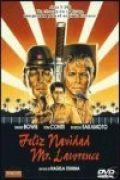
Directed by
Nagisa Oshima
118 minutes
Rated M
Reviewed by
Bernard Hemingway

Merry Christmas Mr Lawrence
Why anyone thought it a good idea to cast David Bowie as a heroic Japanese POW inmate and “soldier’s soldier” is far from clear but they certainly didn’t do so for his physical presence or his acting skills. Not that the incongruity is the only thing wrong with this ill-judged film. In fact it’s hard to find much that is right about it.
Based on a novel by Sir Laurens Van der Post the film replays the familiar The Bridge On The River Kwai opposition between the jolly decent British chaps and their sadistic Japanese captors. Mr Lawrence is Colonel John Lawrence (Tom Conti), a Japanese-speaking British officer who mediates between his blustering old school commander (Jack Thompson) and Captain Yonoi (Ryûichi Sakamoto) and his right-hand man, Sergeant Hara (Takeshi Kitano). Into the mix comes Major Jack 'Strafer' Celliers (David Bowie) and the narrative follows the usual contest of wills path until the war ends.
Little happens in the film and its central dramatic concern, over and above moralistically depicting the clash of cultures, is the relationship between the proud and guilt-striken Celliers and the proud and something striken Yonoi who apparently recognize in each other some neurosis which in turns fuels a home-erotic attraction on Yonoi’s part (presumably this was one of the factors involved in casting Bowie, then a celebrity bi-sexual).
None of this is well handled by director Oshima, who had had a succès de scandale with In the Realm of the Senses (1976). The POW camp setting looks completely fabricated and most of the scenes between the two sides are hand-me-down affairs. At one point the film goes into flashback as Celliers recalls his mistreatment of his younger brother back in England. This is embarrassingly clumsily realized, like a kind of low rent Peter Greenaway, only slight outdone by Bowie/Celliers defiantly chomping on some large red petalled flowers.
Perhaps there was a mismatch between Oshima’s outré sensibility and the material requirements of a POW drama. Thus, it is impossible to tell if Yonoi’s theatrical make-up is intended as an idiosyncracy of the character (unlikely), the ineptitude of the make-up department (unlikely) or some personal statement by the director (most likely). It is somewhat wacky but more of this and less of the generic POW trappings would have possibly made the film interesting.
If Bowie is simply miscast, Tom Conti is given to pulling wry faces and Jack Thompson’s caricatural army man is tiresome. Sakamoto, who also provided the film’s iconic soundtrack is equally caricatural and only Takeshi Kitano, yet to be the cult director he would become, offers some measure of relief to what is a terribly tedious and faintly ridiculous film, that, ironically is only remembered today because of Bowie's presence.
Want something different?





